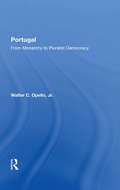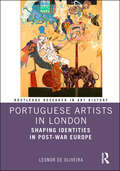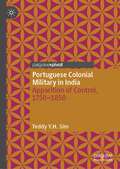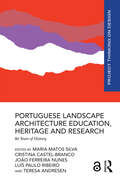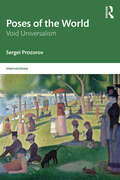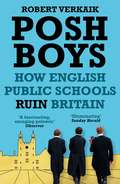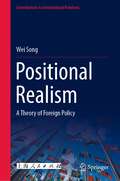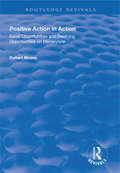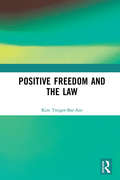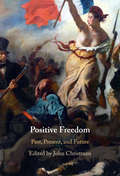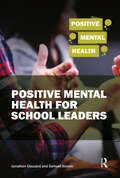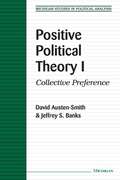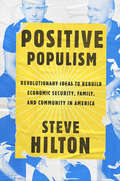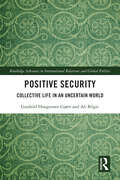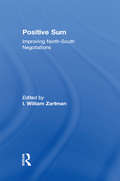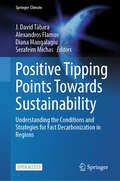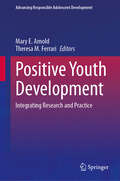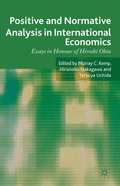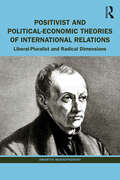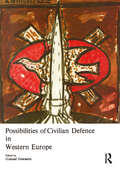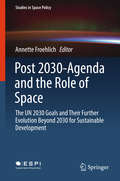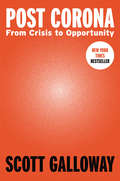- Table View
- List View
Portugal: From Monarchy To Pluralist Democracy (Historical Dictionaries Of Europe Ser.)
by Walter C Opello JrTwo basic processes—industrialization and the emergence of the nation-state—have marked the evolution of many modern societies, particularly in Western Europe. Industrialization broadened the class structure of societies. With the new classes came demands for political power and influence, demands that were vigorously resisted by the ruling monarchies and landowning aristocracies. And with these demands came upheaval and, eventually, new forms of democratic social and political organization. In Portugal’s transition from absolutist monarchy to pluralist democracy can be found an example of these transformative processes at work. Yet the experience of this nation has been largely neglected in discussions of Western European politics. With Portugal: From Monarchy to Pluralist Democracy, Walter C. Opello, Jr., brings the transformation of Portugal into sharp focus and, in doing so, offers interesting insights into the problems of forming a democratic regime. This profile traces Portugal’s transition to democracy within the broader context of its historical development as a nation-state, documenting the effects of absolutism, imperialism, centralization, class and regional cleavages, and late industrialization on the Portuguese people, their polity, economy, and society. Exploring the themes that have shaped the development of Portugal’s democratic structures, Professor Opello also assesses the future viability of these structures in light of the country’s nondemocratic legacies.
Portuguese Artists in London: Shaping Identities in Post-War Europe (Routledge Research in Art History)
by Leonor de OliveiraThis book centres on four Portuguese artists’ journeys between Portugal and Britain and aims at rethinking the cultural and artistic interactions in the post-war Europe, the shaping of new identities within a context of creative experimentalism and transnational dynamics and the artistic responses to political troubles. Leonor de Oliveira examines the contributions of the work of Paula Rego, Barto dos Santos, João Cutileiro and Jorge Vieira, among other artists, to shape referential images of Portuguese identity that not only responded to the purpose of breaking with dominant iconographic and aesthetic representations but also incorporated a critical perspective on contemporaneity. This title will appeal to scholars interested in art history, Portuguese and European art, and the mid-twentieth-century art scene.
Portuguese Colonial Military in India: Apparition of Control, 1750--1850
by Teddy Y.H. SimThis book explores and analyzes developments in the military institution, military engagements as well as the larger security environment of (including non-war violence and maritime regions linking to) the Portuguese Empire in India. These developments occurred under the onslaught of the early modern globalization. The research shows that far from being dilapidated or archaic, the Portuguese colonial military there kept up with some developments in technology and organization in a competitive environment. Although the colonial military was not the most important reason in accounting for the survival of the Portuguese Estado da Índia, nor was the military profession the most lucrative occupation, the Portuguese experience gave indication of how a colonial state and society was able to survive against coalescing threats from the position of weakness. Located in the period and geographical region of the wax and waning of the Mughal and Maratha empires, Portuguese India was not necessarily a more violent place than the surrounding territories although resistance to and uprising against the Portuguese was usually underestimated. Beginning from the attempt at political and military centralization (and standardization) in the eighteenth century, the abolition of the army of the Estado da Índia in the nineteenth marked nominally the end of an era that may have a reverberation on the pacifist perception of Goa today.
Portuguese Landscape Architecture Education, Heritage and Research: 80 Years of History (Project Thinking on Design)
by Cristina Castel-Branco Maria Matos Silva João Ferreira Nunes Luís Paulo Ribeiro Teresa AndresenIn 2022, the Landscape Architecture course in Portugal celebrated 80 years of existence. This edited collection, Portuguese Landscape Architecture Education, Heritage and Research, commemorates this important milestone by bringing together some of the most respected names in Portuguese Landscape Architecture. Although the book’s content is targeted at the assessment of the Portuguese history and influence, the themes under analysis are all-encompassing within the major fields, namely pedagogy; heritage; theory and methods; and design and landscape planning and management. The book seeks to address several research questions, including How has Landscape Architecture evolved in Portugal and how has it been revealed in the different disciplinary areas and educational institutions, particularly considering the great challenges of today? What legacy did Cabral, Sousa da Câmara and the first generation of landscape architects leave us that can be identified in the theory and practice of research projects, recent or ongoing, carried out by Portuguese landscape architects? How has the education, research and practice of Landscape Architecture in Portugal been influenced or reflected by the exchange of knowledge with other countries? This book will be of interest to researchers and students, as it encompasses an extensive contribution to the field of Landscape Architecture studies, aiming to impact both on the theory and practice of the discipline.
Poses of the World: Void Universalism (Interventions)
by Sergei ProzorovPoses of the World develops a theory of the pluralistic coexistence of politics with aesthetic, scientific, ethical and economic procedures that have sought to influence, dominate or even replace politics. We are accustomed to saying that everything is political. It is true that politics has throughout history ventured into the domains that used to be non-political, be they art, science or economy. However, rather than being totally dominated by politics, our societies are marked by the coexistence of diverse procedures, whose logics are distinct but nonetheless remain in contact, ranging from frontal conflict to lasting syntheses. This book develops a theory of this pluralistic coexistence. It builds upon the findings of the first two volumes of Void Universalism to outline an account of pluralism that affirms the incommensurable character of the procedures that regulate the manners of our being and acting in the world. Neither reducible to nor insulated from each other, politics, ethics, art, economy, science and numerous other procedures persist in errancy without ever cohering into any overarching unity. The book demonstrates how the abandonment of the aspiration for such coherence opens up new perspectives on the key sociopolitical debates of our time, from the critique of neoliberalism to concerns over cancel culture. Systematic and accessible, this volume will be of interest to students and scholars of political science, philosophy, sociology, anthropology and cultural studies as well a wider readership beyond academia.
Posh Boys: How English Public Schools Ruin Britain
by Robert Verkaik&‘The latest in the series of powerful books on the divisions in modern Britain, and will take its place on many bookshelves beside Reni Eddo-Lodge&’s Why I&’m No Longer Talking to White People About Race and Owen Jones&’s Chavs.&’ –Andrew Marr, Sunday Times &‘In his fascinating, enraging polemic, Verkaik touches on one of the strangest aspects of the elite schools and their product&’s domination of public life for two and a half centuries: the acquiescence of everyone else.&’ –Observer In Britain today, the government, judiciary and military are all led by an elite who attended private school. Under their watch, our society has become increasingly divided and the gap between rich and poor is now greater than ever before. Is this the country we want to live in? If we care about inequality, we have to talk about public schools. Robert Verkaik issues a searing indictment of the system originally intended to educate the most underprivileged Britons, and outlines how, through meaningful reform, we can finally make society fairer for all.
Position of Power
by Meg ChorlianThe office of the U.S. president is designed to share power between the three branches of government—executive, legislative, and judicial. These three branches balance each other's power to keep the peace and respect the rules.
Positional Realism: A Theory of Foreign Policy (Contributions to International Relations)
by Wei SongThis book adopts the rationalist research path to bring forward an innovative theory of foreign policy, and the central question is: How can we define the overall national interests of great powers appropriately and thus help states make consistent and rational grand strategies? The answer can't be found among existing Foreign Policy Analysis and other theoretical research. In this book, Positional Realism is proposed as a new theory to define the overall national interests from the power position and order position perspectives and specify the four kinds of positional interests of hegemonic states, contending states, potential contending states, and non-contending states. Different great powers have different positional power and order objectives. Based on these positional interests, Positional Realism brings different foreign policy hypotheses and suggestions. The book also examines the six great powers in the nineteenth century to verify these hypotheses and finds that Positional Realism can not only convincingly explain the success or failure of their acts, but also give useful and important directions for strategy making of great powers.
Positive Action in Action: Equal Opportunities and Declining Opportunities on Merseyside (Routledge Revivals)
by Robert MooreFirst published in 1997, this volume describes very clearly the various government policies to promote equal opportunity and the context of urban policy in which they have to be implemented. Robert Moore’s important study addresses the key issue of equal opportunities through a case study of events when a change in government policy appeared to hold out the prospect of new jobs for a highly deprived inner city area. It is a model for all social research of this kind. The result is a very detailed and objective analysis of the problem of implementing equal opportunity policies in practice.
Positive Freedom and the Law: Dignity, Respect, and Expression
by Kim Treiger-Bar-AmThis book explains why we should stop thinking of freedom as limited to a right to be left alone. It explores how Kantian philosophy and Jewish thought instead give rise to a concept of positive freedom. At heart, freedom is inextricably linked to the obligation to respect the autonomy and dignity of others. Freedom thus requires relationships with others and provides an important source of meaning in liberal democratic societies. While individualism is said to foster detachment, positive freedom fosters relations. Moving from moral theory to law, duties are seen as intrinsic to rights. The book considers test cases involving the law of expression, regarding authorial rights and women's prayer at Jerusalem's holy site of the Western Wall. Affirmative duties of respect are essential. Rights held by copyright owners require that all authors – including so-called users – are shown respect. Moreover, rights held by the authorities at the Western Wall require that all worshippers – including those whose interpretation of Jewish law differs from that adopted by the authorities – are respected.
Positive Freedom: Past, Present, and Future
by John ChristmanFreedom is widely regarded as a basic social and political value that is deeply connected to the ideals of democracy, equality, liberation, and social recognition. Many insist that freedom must include conditions that go beyond simple “negative” liberty understood as the absence of constraints; only if freedom includes other conditions such as the capability to act, mental and physical control of oneself, and social recognition by others will it deserve its place in the pantheon of basic social values. Positive Freedom is the first volume to examine the idea of positive liberty in detail and from multiple perspectives. With contributions from leading scholars in ethics and political theory, this collection includes both historical studies of the idea of positive freedom and discussions of its connection to important contemporary issues in social and political philosophy.
Positive Mental Health for School Leaders (Positive Mental Health)
by Jonathan Glazzard Samuel StonesThe mental health of school leaders and managers is just as important as the well-being of those they teach and support. Recent research reveals some alarming statistics, including that 56% of senior leaders have experienced mental ill health in the last year. This book examines a range of relevant issues including workload, inspections, partnerships and approaches to leadership and management in order to address some of these concerns and provide comprehensive guidance and workable, evidence-informed strategies to support those with leadership roles in schools and colleges.
Positive Political Theory I: Collective Preference
by Austen-Smith David Banks Jeffrey S.Positive Political Theory Iis concerned with the formal theory of preference aggregation for collective choice. The theory is developed as generally as possible, covering classes of aggregation methods that include such well-known examples as majority and unanimity rule and focusing in particular on the extent to which any aggregation method is assured to yield a set of "best" alternatives. The book is intended both as a contribution to the theory of collective choice and a pedagogic tool. Austen-Smith and Banks have made the exposition both rigorous and accessible to people with some technical background (e. g. , a course in multivariate calculus). The intended readership ranges from more technically-oriented graduate students and specialists to those students in economics and political science interested less in the technical aspects of the results than in the depth, scope, and importance of the theoretical advances in positive political theory. "This is a stunning book. Austen-Smith and Banks have a deep understanding of the material, and their text gives a powerfully unified and coherent perspective on a vast literature. The exposition is clear-eyed and efficient but never humdrum. Even those familiar with the subject will find trenchant remarks and fresh insights every few pages. Anyone with an interest in contemporary liberal democratic theory will want this book on the shelf. " --Christopher Achen, University of Michigan David Austen-Smith is Professor of Political Science, Professor of Economics, and Professor of Management and Strategy, Northwestern University. Jeffrey S. Banks is Professor of Political Science, California Institute of Technology.
Positive Populism: Revolutionary Ideas to Rebuild Economic Security, Family, and Community in America
by Steve HiltonThe elites still can't believe Donald Trump won or that Britain voted for Brexit. But what’s next for the populist revolution and for the people who believe in it? Fox News host and former government insider Steve Hilton shows how populism can be a positive force for improving lives, with revolutionary ideas to restore the economic security that working Americans once took for granted, and rebuild the ties of family, community and nation that have been ripped apart by decades of policies that favored big government, big business, and the powerful. Recounting his own journey from immigrant roots to the heart of power - and his deeply personal battles with the permanent bureaucracy once there - Hilton vividly describes the scale of change that's needed if the true promise of the populist revolution is to be delivered, including: • An unprecedented assault on centralized government and the administrative state to make sure “Drain The Swamp” is not just a slogan • A completely fresh approach to jobs, schools and skills so every working American can live on what they earn • Practical steps to reverse the disaster of family breakdown so that every child can be raised in a stable, loving home • Ideas to revitalize our communities by giving citizens real control Whether by challenging the excess power of corporations in our economy or the corrupt influence of donors and lobbyists in our government, the ideas in this book echo the intent of America’s founders by taking power from the ruling class and putting it in the hands of the people. For too long, populism has been defined by those who despise it. By focusing on what populism is for, and not just what it’s against, Hilton provides a coherent philosophy and practical blueprint for how the movement can have an impact beyond one election cycle, and in people's everyday lives. That’s Positive Populism.
Positive Security: Collective Life in an Uncertain World (Routledge Advances in International Relations and Global Politics #1)
by Ali Bilgic Gunhild Hoogensen GjørvThis book critically conceptualises positive security and explores multiple areas in global politics where positive security can be studied as an alternative to the existing understandings and practices of security. Structured through a framework on the practice and ethics of everyday security, the book defines positive security as a focal point of contextual and spatiotemporal moments that emerge through encounters with ‘the other’ in everyday politics. In these moments, an actor can show attentiveness and humility towards ‘the other’. In this book, the authors present their own understandings of positive security, offering an in-depth discussion and analysis of the Global North and South divides, delving into many aspects such as human security, migration, gender, indigenous issues and perceptions of security in the Arctic, and challenges and tensions for and within NATO. The book concludes by reflecting on the significance of positive security, looking at its application for other current issues including how to understand and manage new (in)security challenges including hybrid threats and warfare. This book will be of interest to students and scholars of international relations, critical security and peace studies.
Positive Sum: Improving North-South Negotiations
by I. William ZartmanThe claims of the developing countries for more equal participation in existing international economic arrangements have been eclipsed temporarily by global economic recession and the pressures on developing countries to adjust their economies to radically changed circumstances. But negotiations between the industrial countries of the North and the developing countries of the South will remain an important feature of international politics in the years ahead. Careful analysis of the negotiating experience of the 1970s—when the pressures of the South for reform of the international economic system reached their peak in a wide variety of international forums—can help improve the negotiating process itself as well as policy formulation.Positive Sum focuses on the relationship of the process of the negotiations of the recent past to their final outcomes. This emphasis differentiates it from the many works on North-South relations that assess results only.The volume presents eight case studies of specific North-South negotiations, prepared as part of a project of the Overseas Development Council in Washington, D.C. The book's emphasis is on pragmatic paths-conflict management, conciliation, cooperation—to mutually satisfactory solutions in asymmetrical situations. In its policy recommendations, the study seeks to move the parties away from sharp divisions between the rich and strong on one side and the poor and relatively weak on the other. Its objective is to identify tactics and procedures that are more likely to deliver "positive sum" (mutually beneficial) rather than "zero-sum" (winner takes all) results. The book offers useful guidelines for negotiators and analysts of future multilateral negotiations.
Positive Tipping Points Towards Sustainability: Understanding the Conditions and Strategies for Fast Decarbonization in Regions (Springer Climate)
by J. David Tàbara Alexandros Flamos Diana Mangalagiu Serafeim MichasThis open access book provides the first comprehensive review of the state of the art of social tipping points applied to energy systems from a social interdisciplinary perspective. It does so by presenting a novel theory of systemic and transformative change, linking it to empirical cases assisted with relevant assessment methodologies, including modeling. The authors unveil the narratives and visions, the transformative capacities as well as deliberate strategies and collective actions that at one point in time have been able - or were prevented - to tip a given social-ecological system towards low-carbon, sustainable trajectories in diverse high-intensive carbon regions around the world. This volume shows that self-reinforcing learning feedbacks connecting transformative solutions and strategies across scales and domains can be induced by targeted policy interventions both in local and regional contexts. It further indicates how changes in behavioral patterns, supported by good governance of disruptive technologies, carbon (dis)investment and finance processes as well as new forms of civic engagement, can create the necessary transformative enabling conditions for the emergence of positive tipping points towards low-carbon sustainable futures. The book is a must-read for students, researchers, and scholars, as well as policy-makers and practitioners interested in a better understanding of sustainability, climate, and energy issues and in assessing the potential impacts and effectiveness of strategic interventions aimed at accelerating just sustainable decarbonization processes.
Positive Youth Development: Integrating Research and Practice (Advancing Responsible Adolescent Development)
by Mary E. Arnold Theresa M. FerrariThis book presents positive youth development research in easy-to-understand concepts that have direct and clear application to youth development practice. Using the 4-H Thriving Model as an example, it discusses key areas of youth development research, such as developmental settings, learning and development, and youth thriving, in the context of their relevance to effective youth development practice. Each chapter examines a particular aspect of youth development research, providing a succinct summary of the topic, detailing implications for youth development practice, and offering guidance for translating the research into practice. Contributors introduce the need for high-quality, science-based youth development programs, the importance of high-quality youth development settings, critical facets of youth thriving, and the benefits of such programs to society writ large. Key areas of coverage include: The science of learning and development as well as the role of learning and meaning making Positive youth development program models and high-quality youth program settings Youth belonging and equity in youth programming Developmental relationships, challenge and growth mindset, and prosocial development as well as purpose, hope, and identity Transcendent awareness, emotional regulation, and self-regulation and goal setting Positive Youth Development is an essential resource for all professionals, clinicians, and practitioners as well as researchers, educators, and graduate stud
Positive and Normative Analysis in International Economics
by Murray Kemp Hironobu Nagakawa Tatsuya UchidaThis volume addresses important issues in international economics with contributions from an array of prominent researchers a manifestation of Hiroshi Ohta's cross-border research network and his passionate dedication to economics. Contributions range from studies on positive and normative trade theory, innovation in international trade and interactions between domestic and foreign firms and industries, to studies of a more empirical nature. The empiricalcontributions focus on preferential trading arrangements, global imbalances and exchange rates, as well asprovidingan in-depth analysis of the Japanese economy. The featured topics are explored from both positive and normative perspectives. Positive analysis describes how the economy functions, dealing primarily with what 'is'. Normative analysis is concerned with what 'should be'. This combined approach enables the formation of a base from which credible policy evaluation can take place. "
Positively American: Winning Back the Middle-Class Majority One Family at a Time
by Chuck Schumer<p>New York's popular senior senator, who won reelection by the largest margin in the state's history, offers a bold plan for change in the Democratic party. <p>As the results of the last presidential election played out, it became clear that while Democrats call themselves the party of the middle, the middle class does not consider the Democrats their party. <p>Now, Chuck Schumer, who has gained national prominence as the head of the Democratic Senatorial Campaign Committee and as a member of the Finance Committee, offers his plan for capturing the middle-class vote and moving his party back into the majority. Democrats can accomplish this, the senator explains, without abandoning their traditional principles.Schumer envisions a hypothetical, average middle-class American family--he thinks of them as "The Baileys"--who spend "as much time talking about the cost of cornflakes as the cost of the national debt." <p>He then details specific proposals he believes would keep America safe, secure, and on top, and support the aspirations of a prosperous and growing middle class, while also speaking to anxieties created in a world changed by technology and globalization.
Positivist and Political-Economic Theories of International Relations: Liberal-Pluralist and Radical Dimensions
by Amartya MukhopadhyayThis book provides an introduction to positivist-pluralist theories of international relations (IR) which emerged during the early-and mid-1950’s along with Marxist political economic and non-Marxist economic theories of IR. Positivist and Political-Economic Theories of International Relations is an in-depth critical study of texts and literature which highlight IR’s methodological pluralism even after it gained maturity. It examines how pluralist political status quo and radical economic criticism coexist in discrete areas of the discipline. Insights are provided into key positivist liberal-pluralist theories, namely decision-making approaches, and theories of integration, regionalism, interdependence, and regime. It discusses the four political economic and critical theories of Marxism, dependency, world systems, and international political economy. The book, as an advanced supplementary reader, will be of great interest to researchers and students of international relations, history, law, and the multidisciplinary social scientific field of political economy.
Possibilities of Civilian Defense in Western Europe
by Gustaaf GeeraertsThis is a collection of the 13 essays making up the proceedings of the 2nd international working conference on violence and non-violent action in industrialized Societies held in Brussels on the March 24-26th, 1976.
Post 2030-Agenda and the Role of Space: The UN 2030 Goals and Their Further Evolution Beyond 2030 for Sustainable Development (Studies in Space Policy #17)
by Annette FroehlichThis book provides a deep insight to which extent further improvement should be envisaged to ensure and improve the sustainable development beyond 2030 (the Sustainable Development Goals is a set of 17 global goals with 169 associated targets which the state community adopted in 2015). As the world, its environment, economy and society is getting more and more technical advanced, it is of high interest to analyze how space and its various applications can support this development. Once the Goals of the “2030 Agenda for Sustainable Development” will be achieved new challenges are waiting. The analysis takes into account a proactive use of artificial intelligence for the development based on space infrastructure. Another important aspect revolves around the economic development which asks for further analysis of the cryptocurrencies relationship with space applications and how to use space based cryptocurrencies for development. Environment-wise the challenges for a sustainable development on Earth i.e. water supply, but also in outer space are requested ensuring a sustainable exploration and exploitation of space and its orbital resources. The book also highlights possible contributions of the post-2030 space industry to global economic development based on satellite technology and the enlargement of the scope of application of satellite data in administration and Justice to ensure development of effective, accountable and transparent institutions at all levels to promote growth, stability and security and peace on global level.
Post 9/11 and the State of Permanent Legal Emergency
by Aniceto MasferrerThe terrorist attacks occurred in the United States on 11 September 2001 have profoundly altered and reshaped the priorities of criminal justice systems around the world. Atrocities like the 9/11 attacks, the Madrid train bombings of March 2003, and the terrorist act to the United Kingdom of July 2005 threatened the life of democratic nations. The volume explores the response of democratic nation-states to the problems of terrorism and counter-terrorism within the framework of the Rule of Law. One of the primary subjects of study is the ways in which the interests of the state (security from external threats, the maintenance of civil peace, and the promotion of the commonwealth) are balanced or not with the liberty and freedom of the citizens of the state. The distinctive aspect of this focus is that it brings a historical, political, philosophical and comparative approach to the contemporary shape and purposes of the criminal justice systems around the world.
Post Corona: From Crisis to Opportunity
by Scott Galloway"This is as good an analysis as you could wish to read." --The Financial TimesFrom bestselling author and NYU Business School professor Scott Galloway comes a keenly insightful, urgent analysis of who stands to win and who's at risk to lose in a post-pandemic worldThe COVID-19 outbreak has turned bedrooms into offices, pitted young against old, and widened the gaps between rich and poor, red and blue, the mask wearers and the mask haters. Some businesses--like home exercise company Peloton, video conference software maker Zoom, and Amazon--woke up to find themselves crushed under an avalanche of consumer demand. Others--like the restaurant, travel, hospitality, and live entertainment industries--scrambled to escape obliteration.But as New York Times bestselling author Scott Galloway argues, the pandemic has not been a change agent so much as an accelerant of trends already well underway. In Post Corona, he outlines the contours of the crisis and the opportunities that lie ahead. Some businesses, like the powerful tech monopolies, will thrive as a result of the disruption. Other industries, like higher education, will struggle to maintain a value proposition that no longer makes sense when we can't stand shoulder to shoulder. And the pandemic has accelerated deeper trends in government and society, exposing a widening gap between our vision of America as a land of opportunity, and the troubling realities of our declining wellbeing.Combining his signature humor and brash style with sharp business insights and the occasional dose of righteous anger, Galloway offers both warning and hope in equal measure. As he writes, "Our commonwealth didn't just happen, it was shaped. We chose this path--no trend is permanent and can't be made worse or corrected."
